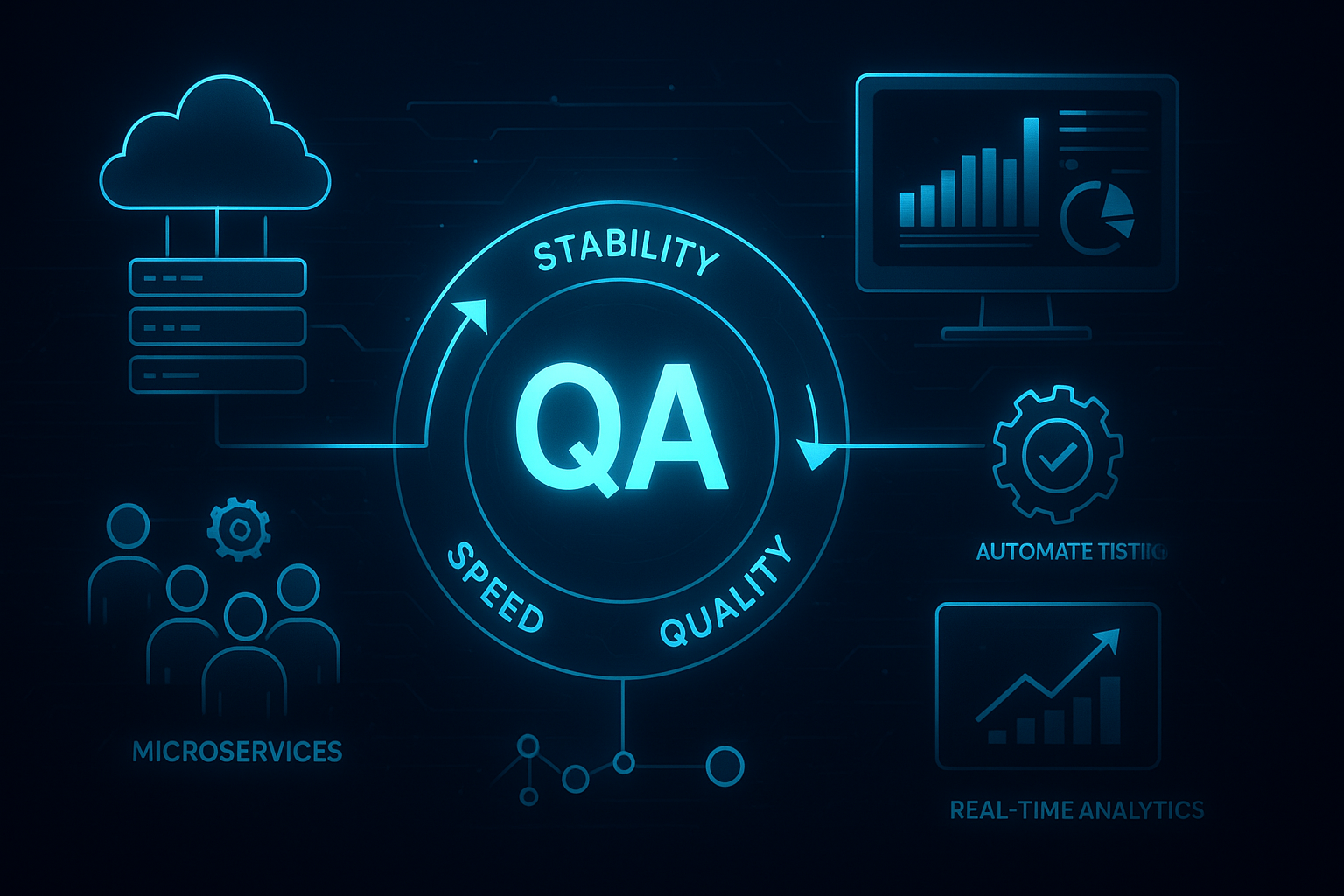Role of QA in Digital Transformation & Scalable Software Delivery
Digital transformation isn’t just about adopting new technologies—it’s about creating systems that can scale, adapt, and perform flawlessly in real time. And at the heart of every successful transformation initiative lies Quality Assurance (QA).
Modern QA is no longer a gatekeeping function at the end of development—it’s a continuous, integrated enabler of digital acceleration. In this guide, we’ll break down the evolving role of QA in digital transformation journeys, how it supports agile and DevOps initiatives, and best practices for scalable QA delivery.
QA in Digital Transformation: The Highlights
-
🧪 QA is critical in reducing risk and accelerating innovation during digital transformation.
-
🔄 QA practices are evolving with Agile, DevOps, CI/CD, and cloud-native architectures.
-
📈 Scalable QA strategies require test automation, continuous feedback, and team integration.
-
💡 QA drives business value by ensuring product reliability, speed, and user experience.
Why QA Matters in Digital Transformation
As companies move toward cloud-native platforms, microservices, and digital-first business models, QA ensures these changes don’t break critical systems or user trust.
The Stakes Are High:
-
One bad release = lost users
-
One missed bug = security vulnerability
-
One untested scenario = broken integrations
QA’s Strategic Role in Digital Transformation:
-
Validates business logic across legacy and modern systems
-
Ensures release confidence across multiple devices and environments
-
Enables faster, high-quality iterations via test automation and CI/CD
How QA Supports Agile, DevOps & Modern SDLCs
Digital transformation goes hand-in-hand with agile methodologies and DevOps pipelines, which demand speed, collaboration, and quality at every stage.
🔁 QA in Agile:
-
Participates in daily standups and sprint planning
-
Helps define acceptance criteria and testable stories
-
Conducts exploratory and regression testing within sprints
🔄 QA in DevOps:
-
Builds automation suites integrated into CI/CD
-
Enables “shift-left” testing—catching defects earlier
-
Tracks quality metrics like test coverage, flakiness, and defect density
How is QA integrated into DevOps and Agile?
QA collaborates closely with developers, product managers, and DevOps to write, run, and automate tests within the SDLC—often in real time.

Building Scalable QA for Digital Delivery
Scaling your QA function means ensuring quality across:
-
Multiple product lines
-
High-velocity releases
-
Diverse platforms (web, mobile, API, cloud)
Best Practices for Scalable QA:
-
Test Automation at Scale:
-
Use frameworks like Selenium, Cypress, Playwright
-
Automate UI, regression, and smoke tests
-
-
Continuous Testing in CI/CD:
-
Integrate testing into Jenkins, GitHub Actions, GitLab pipelines
-
-
Test Environment Management:
-
Use containerized environments (Docker/K8s)
-
Maintain parity across dev, staging, and prod
-
-
Real-Time Reporting:
-
Use dashboards, alerts, and defect analytics for visibility
-
-
Cloud Testing Infrastructure:
-
Use platforms like BrowserStack and Sauce Labs for cross-browser/mobile testing
🚀 Need to scale QA for your digital transformation roadmap?
Explore INT Global’s QA Consulting Services for flexible, automation-first solutions tailored to your growth needs. -
QA as a Business Enabler, Not Just a Gatekeeper
Modern QA delivers more than defect detection—it delivers business value.
Business Outcomes from Strong QA:
-
💰 Lower Cost of Failure: Early bug detection reduces production rework
-
📱 Superior User Experience: Fewer crashes, faster apps, better usability
-
⚙️ Operational Efficiency: Devs spend less time fixing bugs, more on building
-
🚀 Faster Time to Market: Releases are tested, stable, and production-ready
Case Study: QA in Action During Digital Transformation
A global logistics provider migrated its legacy ERP to a cloud-native SaaS solution. QA played a central role:
-
Automated over 3,000 test cases across modules
-
Built CI/CD pipelines for daily builds
-
Cut release cycle from 6 weeks to 1 week
-
Reduced post-release defects by 70%
🔧 Transforming digitally? QA is your safety net.
Talk to our QA transformation experts and see how we can help you implement scalable QA for faster, safer delivery.
📚 Frequently Asked Questions
❓ How does QA support digital transformation?
QA ensures that new technologies, platforms, and features are tested, reliable, and secure—critical for successful transformation outcomes.
❓ What is scalable QA?
Scalable QA refers to practices and infrastructure that can grow with your product—supporting larger user bases, frequent releases, and broader testing needs.
❓ Why is automation important in digital QA?
Automation reduces testing time, increases coverage, and ensures repeatability—essential in CI/CD-driven development.
❓ What challenges do teams face with QA in transformation?
-
Legacy systems
-
Tool integration
-
Team silos
-
Inconsistent environments
❓ What QA tools are used in digital transformation?
Common tools include Selenium, TestRail, Jenkins, Cypress, Postman, JMeter, BrowserStack, and cloud-based test labs.






